Earlier this month, Semafor, the global news platform, announced the launch of "China and Global Business" in partnership with the Center for China and Globalization (CCG), a non-governmental thinktank in China. The inaugural "China and Global Business" will take place in Beijing on October 17-19 preceded by an initial convening this June in NYC.
Justin Smith, Co-Founder & CEO, wrote
Chinese law requires foreign news organizations to engage with local partners to produce events like these. In this case, we are working with a Beijing-based think tank, the “Center for China and Globalization,” and the “China Public Diplomacy Association,” an organization under the Foreign Ministry. Those partners will secure required approvals, and issue formal invitations to Chinese speakers and audience members. CCG will take on local administrative responsibilities and coordinate with local sponsors, and Semafor will pay CCG for their services. The platform will be exclusively underwritten by corporate partnerships with no financial contributions from our local Chinese partners or the Chinese government.
Ben Smith, Co-Founder & Editor-in-Chief, wrote
The contradiction at the heart of the U.S.-China relationship is one of the biggest stories in the world. Geopolitical forces are pulling the two countries apart. But their bilateral trade is just now hitting new record highs. The coming years will determine whether the world’s two largest economies, which are deeply enmeshed, can find ways to manage their differences; or whether the economy is simply another front for an escalating conflict.
National politics in many western countries is entering a cycle of politicians competing to be the most hawkish voice. But the role of journalism is to explore the complex reality of a situation without clear historical precedent. This moment has little in common with Cold War analogies — except, perhaps, for how high the stakes are. That’s why these gatherings and the journalism that emerges from them are so important. We’re offering our global news platform for an open discussion — as we have with the Semafor World Economy Summit and Semafor Africa Week — based on our values of transparency, journalistic independence, and openness to multiple perspectives.
"China & Global Business" will embrace a diversity of opinion throughout its year-long program and will be guided by a Chinese and global advisory board composed of key actors from the worlds of business, diplomacy, academia, and the media who will work together to identify areas of common interest to guide our main stage deliberations and ongoing discourse.
They include:
Jessica Chen Weiss, Professor of Government, Cornell University
Deborah Lehr, CEO of Edelman Global Advisory
Rana Mitter, Professor of the History and Politics of Modern China, Oxford University
David Rubenstein, Co-Founder and Co-Chairman of The Carlyle Group
Justin B. Smith, Co-Founder and CEO, Semafor
John Thornton, Executive Chairman of Barrick Gold and Chairman of PineBridge Investments
Susan Thornton, Senior Fellow and Visiting Lecturer of Law at the Yale Law School Paul Tsai China Center
Jerry Yang, co-founder, Yahoo! Inc and Founding Partner at AME Cloud Ventures
Gao Yunlong, Chairman of the All-China Federation of Industry and Commerce
Zhou Xiaochuan, Vice Chairman of and China’s Chief Representative to the Boao Forum for Asia
Chen Deming, Former Minister of Commerce
Wu Hailong, President of the China Public Diplomacy Association
Cui Tiankai, Former Chinese Ambassador to the U.S. and to Japan
Xue Lan, Dean of Schwarzman College at Tsinghua University
Wang Huiyao, Founder and President of the Center for China and Globalization (CCG)
Cao Dewang, Chairman of Fuyao Group
Zhang Yichen, Chairman and CEO of CITIC Capital Holdings Limited
Zeng Yuqun, Chairman of Contemporary Amperex Technology Co. Limited
Following the announcement, there have been press reports about CCG and Henry Huiyao WANG, its Founder and President. CCG wishes to provide the following information to, as the Chinese saying goes, "seek truth from facts."
CCG is a non-governmental thinktank and is recognized as such both inside and outside the People’s Republic of China (PRC).
Financially, CCG relies on corporate donations and research grants for funding and also generates revenue from publications, event sponsorship, providing research services, etc., in line with international practice.
The Communist Party of China (CPC) and the PRC government do NOT have a budget for CCG.
CCG funding sources are annually disclosed to its advisory council meeting. In a 2022 interview, Wang disclosed some of CCG's past or present donors.From the personnel perspective, CCG's founders and staff are not employees of the CPC or the PRC government.
For example, CPC and PRC government employees have their respective 编制 (bianzhi, the authorized personnel headcount) within the CPC or PRC government system. CCG personnel do not.
All CPC and PRC government employees are categorized into a 级别 (jibie, or ranking) system, where everyone has a jibie. CCG personnel do not.
CCG personnel do not enjoy the benefits exclusive to CPC or PRC government employees. CCG personnel pay their pension and medical care insurance contributions to a scheme joined by the Chinese private sector workers.The legal entity of CCG is, in the PRC, a 社会组织 non-governmental organization (NGOs) registered with Beijing Municipal Civil Affairs Bureau, as other NGOs are. Web pages of the Beijing Municipal Civil Affairs Bureau dated 2016 and 2019 speak to that.
Xinhua, China’s state news agency, refers to CCG as a non-governmental thinktank, as every other Chinese news media do.
CCG has also been frequently described in reputable international media outlets as a non-government thinktank, such as in the Financial Times, NBC News, and Bloomberg.
CCG has been granted the "Special Consultative Status" as a non-governmental organization by the United Nations Economic and Social Council (ECOSOC).
The widely-cited Global Go To Think Tank Index Report, produced by the Think Tanks and Civil Societies Program (TTCSP) of the Lauder Institute at the University of Pennsylvania, lists CCG as one of the "2020 Best Independent Think Tanks" (Page 332). (The 2020 report is the latest edition available so far.)
Some media reports cherry-picked one instance - incorrectly - to insinuate Wang is problematic, disregarding that Wang - and CCG under his leadership - has been consistently welcomed in the U.S. and beyond.
A May 7, 2023 report incorrectly said, “Wang bowed out of appearing on a panel discussion” on May 8, 2018, due to an inaccurate May 7 2018, report.
The fact is that Wang didn’t give final confirmation to attend the Wilson Center-organized panel on May 8, 2018, and was welcomed on the same day by two prominent U.S. thinktanks and a South Korean one in Washington DC.
Following the May 7, 2018, report, Wang was welcomed to other prominent thinktanks on May 9, 10, and 11.
Moreover, the Wilson Center invited Wang in 2019 and again in 2020, underscoring its continued relationship with Wang.
CCG has been a frequent and cherished port of call and bridge-builder for foreign diplomats and thinktankers. There are numerous examples.
Subscribers to CCG Update may recall, for example, CCG’s side event at the Munich Security Conference with high-caliber participants and speakers
In the past year, Wang has also been hosting CCG Global Dialogue Series with global opinion leaders, including former senior U.S. diplomats and others with significant and sophisticated expertise on China.
CCG was not founded, run, or financed by the Western Returned Scholars Association (WRSA). It had and has no institutional link to WRSA.
CCG was founded by Henry Huiyao WANG and Mable Lu MIAO in 2008. WRSA did not and does not lead, oversee, or regulate CCG or CCG personnel. WRSA did not and does not finance CCG either.
Non-governmental thinktanks engage in research, discussion, dissemination, and recommendations of policy proposals from outside the State, and to grow one was - and perhaps remains - not an easy undertaking in the transition from a State-commanded economy to a market one.
Wang, formerly a student in the West, was playing a limited role in the WRSA, comprising Western returned scholars - widely considered the most open, progressive, and internationally-minded Chinese who bring back the knowledge, lessons, and wisdom from the West to China.
CCG, at the time, incorrectly said WRSA was one initiator of CCG. In trying to survive, exist, and develop, CCG staff took advantage of what was plausibly available in an imperfect development environment and felt then it was preferable to mention what could be its most plausible link to an organization with over 100 years of history - longer than the CPC or PRC.
In their 2014 book 《大国智库》【1】【2】, Henry Huiyao WANG and Mable Lu MIAO looked at various types of thinktanks in China. They emphasized the particular importance of 民营智库 private thinktanks, where CCG, by their telling, was one of them. An excerpt from the book is available
我们强调民营智库的概念,而不遵循“民间智库”这种通常性的提法,主要是为了突出“民营”的概念,以强调其在运营模式上与官办智库、高校智库的本质差异。就像中国有民营经济大发展时代一样,中国同样也可以有民营智库大发展的时代。
中国民营智库真正开始快速发展,始于十四大之后市场经济体制的建立和中国政府职能的转变。由于发展环境的不完善,民营智库处于绝对弱势地位,发展艰难。
We emphasize the concept of private think tanks rather than using the commonly used term 民间智库 "non-state think tanks" in order to highlight the "private" nature and emphasize the essential differences in operating models from state-run and university think tanks. Just as China has experienced a period of rapid development in private economy, China can also have a period of rapid development in private think tanks.
The rapid development of private think tanks in China began after the establishment of the market economy system and the transformation of the Chinese government's functions following the 14th National Congress. Due to the imperfect development environment, private think tanks were in an absolutely disadvantaged position and faced great difficulties in development.
4.新型民营智库
A new type of private thinktanks
新型民营智库如雨后春笋般涌现出来。比较典型的有……中国与全球化智库 (CCG)等。
A new type of private think tanks has emerged like mushrooms after rain. Some typical examples include...the Center for China and Globalization (CCG).
Before CCG secured a non-governmental organization registration, the predecessor to CCG, known as 中国与全球化研究中心, was under the umbrella of a business entity of Wang.
Wang doesn’t have any role with the WRSA. When he did, the role was on its 理事会 Council similar to advisory boards internationally, and not involved in the operations of the WRSA.
When he was in the 理事会 Council of the WRSA, his role was similar to the roles he played in numerous organizations. He was not working or on the Staff/payroll of WRSA. The 理事会 Council of the WRSA is similar to a sort of advisory board that is internationally common and has two dozen Vice Chairs with full-time jobs elsewhere.
As with other advisory boards internationally, the Council typically meets once a year and isn't involved in the operations of the WRSA.
The people who work for or are on the Staff/payroll of WRSA are the people working in and under their 工作机构 working staff organization, which is distinctly different from the function of the Council.
He exited the WRSA in 2021. The WRSA publishes the names of people on its 理事会 Council. His name 王辉耀 is not in the current (8th) 理事会 Council.
As an accomplished think tanker, Wang had many titles from different organizations and scenarios, including but not limited to organizations associated with the Ministry of Foreign Affairs, the Ministry of Commerce, the Ministry of Human Resources and Social Security, the National Development and Reform Commission, and the United Front Work Department (UFWD) . None of those titles - mostly advisory roles - were formal employment, and many were temporary, if not fleeting, and sometimes honorary or ceremonial.
Over the years, his most significant, long-time title outside his full-time job of leading CCG was former 国务院参事 Counselor to China State Council, which was an advisory role to the Chinese government appointed by then Premier Li Keqiang in 2015.
It’s unreasonable to obscure this title - and many others - while obsessing about his relationship with the UFWD.
In addition, regrettably, the UFWD has been hyped in certain quarters to be, so to speak, “the sum of all fears.”
CCG consistently takes pro-international engagement, pro-openness, and progressive policy stances.
Below are some examples.
CCG publicly advocated China's joining TPP - the predecessor of CPTPP - in February 2017, long before the idea was popular.
CCG publicly advocated China adopting a much more open and flexible visa regime.
CCG advocated China giving permanent residences to foreigners to the extent that Wang has been called a traitor - and this is just one of the instances that CCG came under attack dometically.
From The Economist in 2020
Wang Huiyao heads a think-tank, the Centre for China and Globalisation, which promoted the permanent-residency scheme. For his pains he has been vilified online as a traitor.
CCG also advocated for more U.S. journalists in the Chinese mainland and vice versa. One latest example came at the inaugural meeting of the China and Global Business forum, where Wang called for
从恢复中美记者交流的步骤到增进人文交往
steps to restore exchanges between Chinese and U.S. journalists to suggestions for enhancing cultural exchanges.




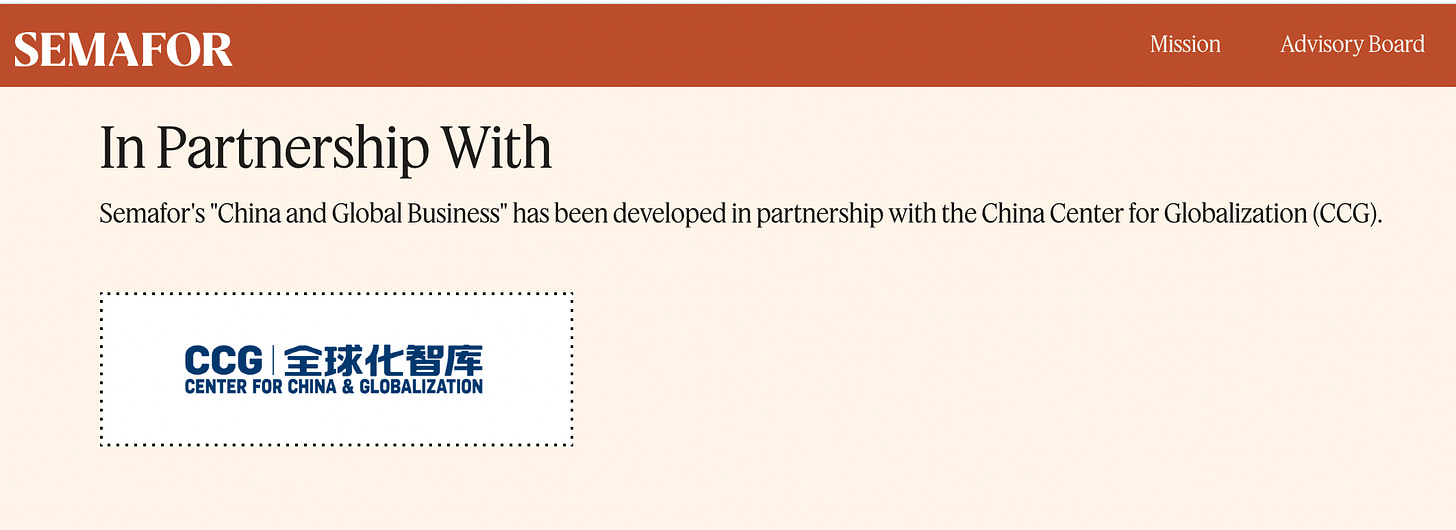
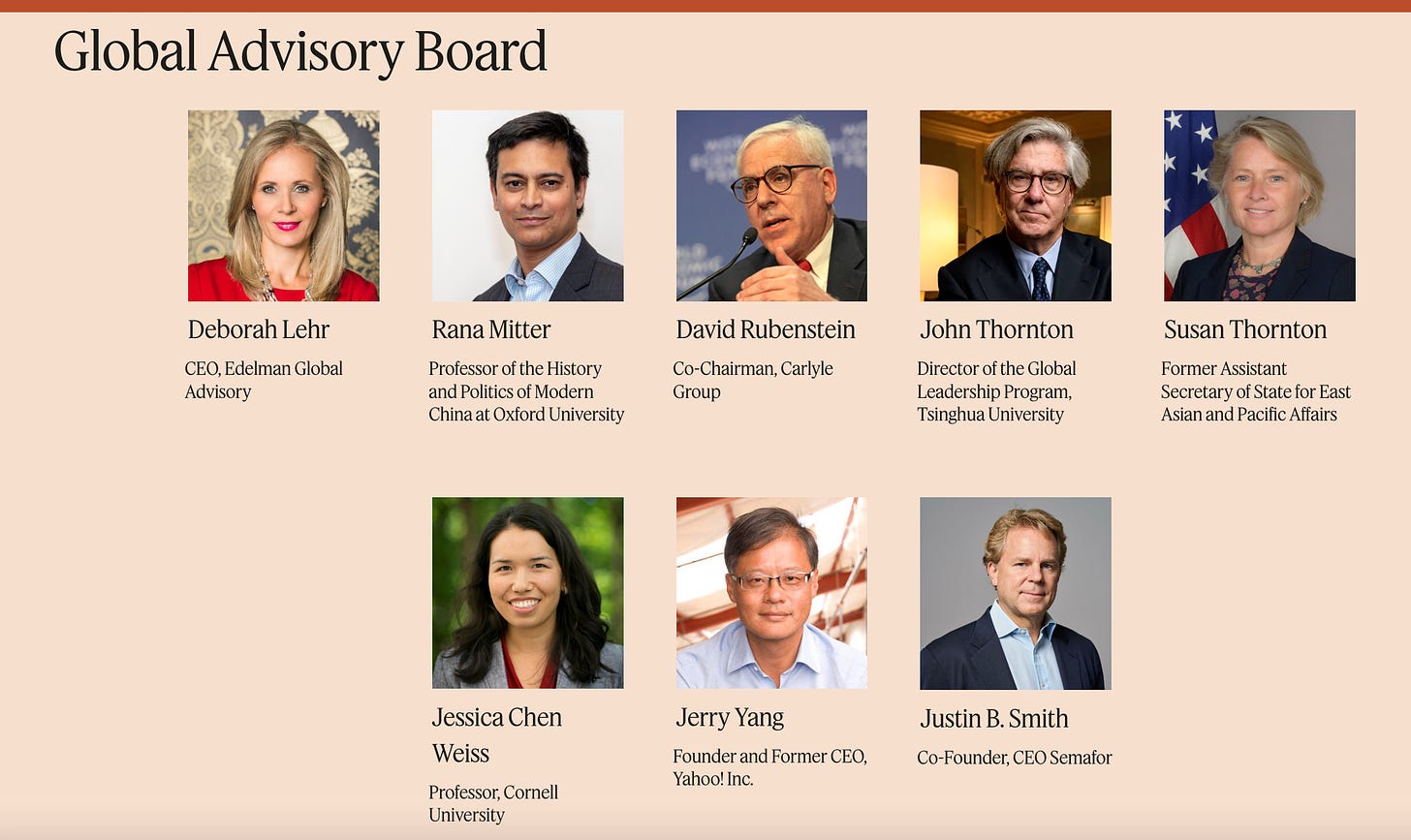
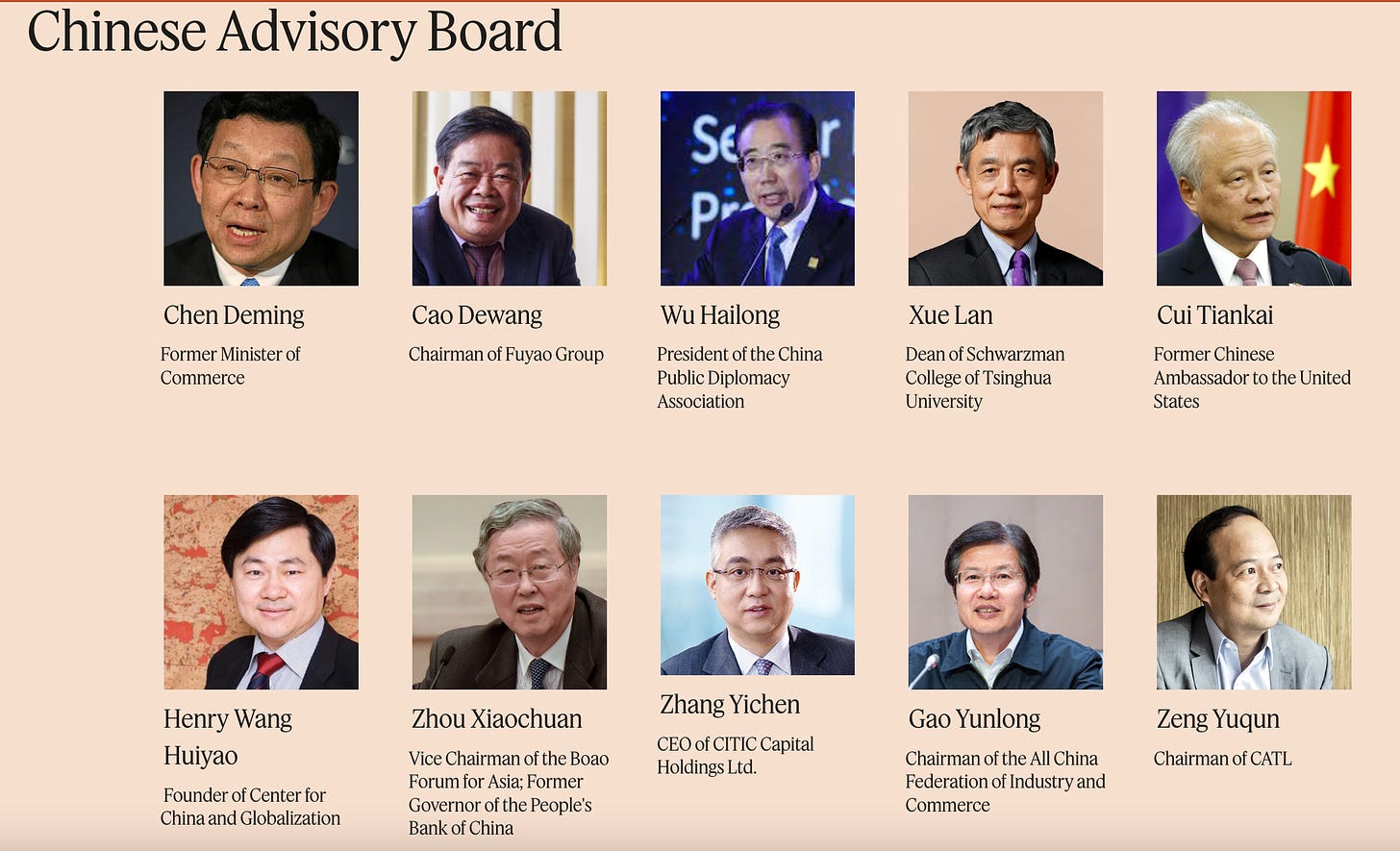

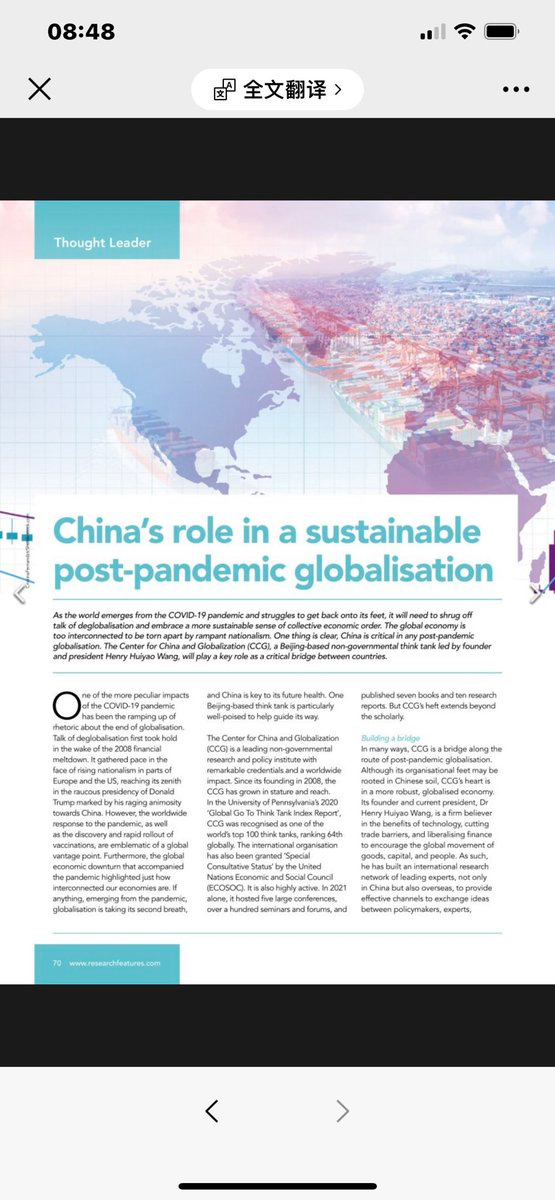
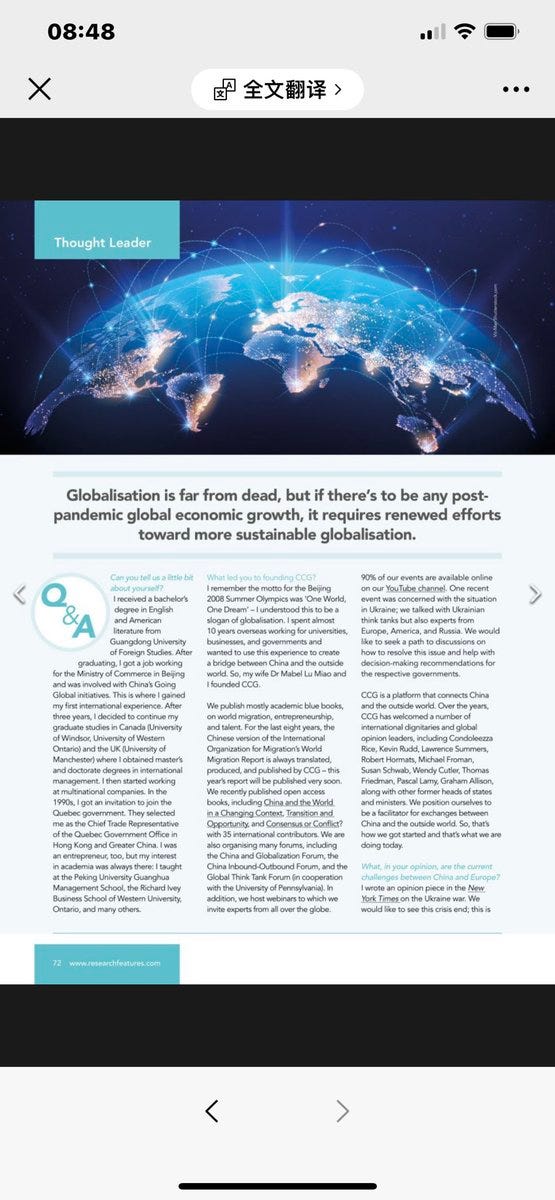
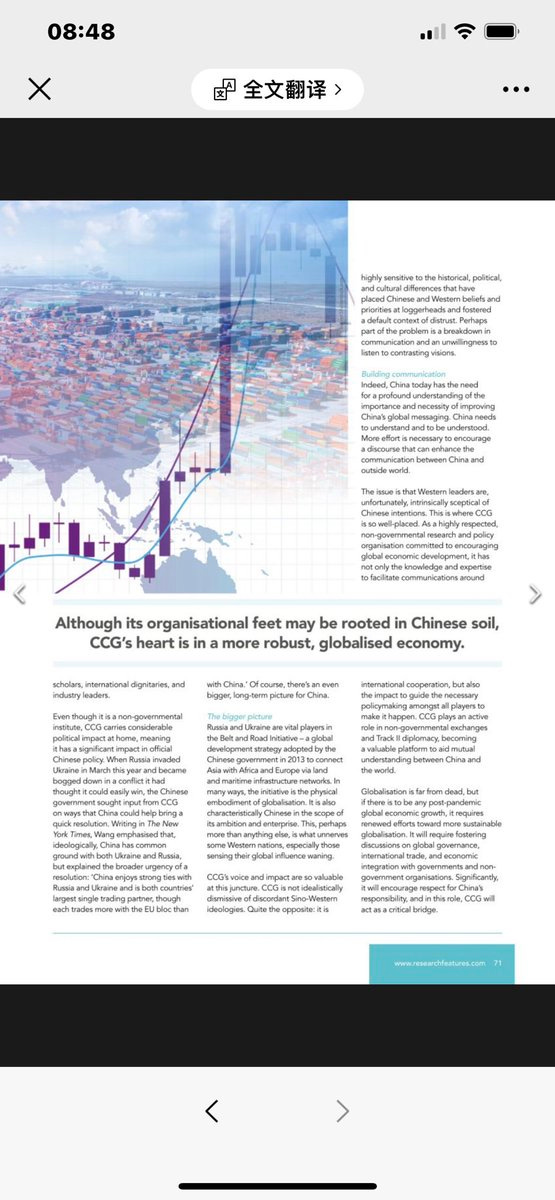
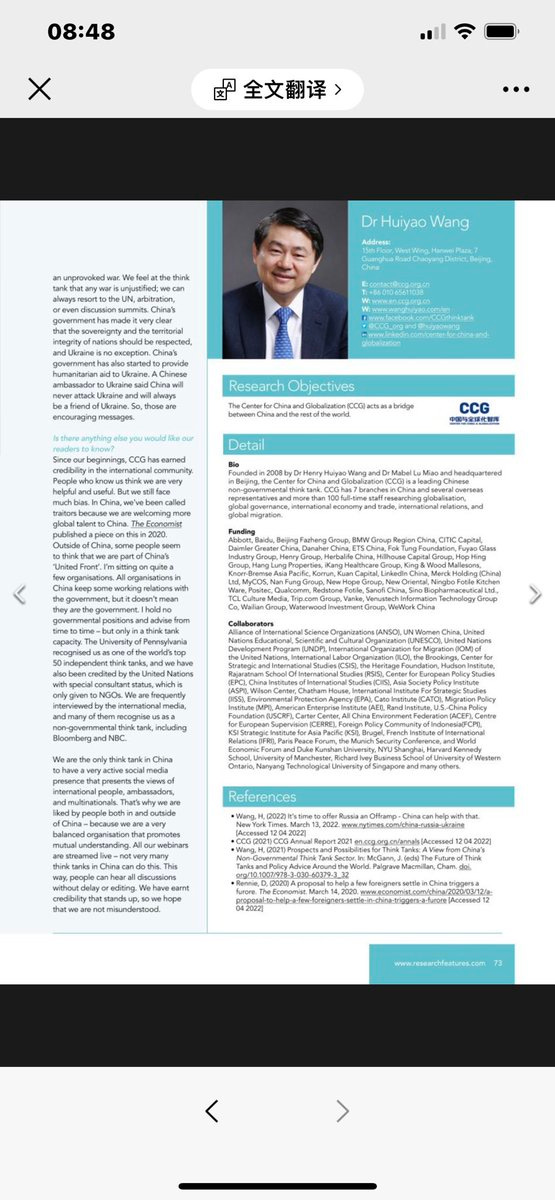

As an American who worked in Jimmy Carter's administration as a political appointee, I am pleased to be associated with CCG because we need more bridges to link East and West at a time when they're so scarce but needed now more than ever. CCG is in fact not only a think tank, it's a do tank and it's a masterful builder of bridges. I was particularly impressed that during President Trump's term, CCG reached out to institutions like Hudson Institute and critics of China like Michael Pillsbury to dialogue with American conservative leaders. I applaud the inspired win-win hookup with Semafor as I've long been a fan of Steve Clemons. If our planet is to survive the current difficulties, which is by no means a given, it will be due in part to the good work that CCG does, led by Henry and Mabel.